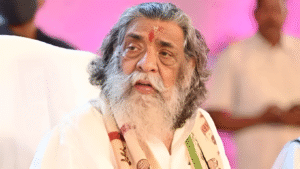
Shibu Soren was a true tribal rebel. At a time when tribal communities were suffering under the exploitative practices of usury and moneylending, he emerged as a powerful voice of resistance and became a hero to his people. What began as a movement against the oppressive Dhankatni system gradually evolved into a broader struggle for a separate political identity for Jharkhand. In his 81 years, Shibu Soren—fondly known as Guruji—has lived a life marked by countless stories of revolution and defiance.
Dishom Guru Shibu Soren, the towering banyan tree of Jharkhand’s struggle and resistance, passed away on the morning of 4 August 2025 at Delhi’s Gangaram Hospital. Revered across Jharkhand and the nation, he was fondly called Dishom Guru a title meaning ‘the one who shows the way’ or ‘the guide’. At 81, Shibu Soren had earned this honor through a lifetime of unwavering dedication to the tribal cause and the fight for Jharkhand’s identity.
Shibu Soren was the most widely accepted and revered leader among the tribal communities. Born on 11 January 1944, he carried forward the legacy of rebellion in Jharkhand—a flame first ignited by Dharti Aba (Father of the Earth), Birsa Munda. While Birsa Munda’s revolution challenged British colonial rule, Dishom Guru Shibu Soren led a resistance against internal systems of oppression, where tribal society suffered under exploitation, usury, and an unjust moneylending system.
When Dishom Guru Shibu Soren began his struggle, the forests of Jharkhand became both his shelter and battleground. For years, he wandered through the dense jungles, evading police bullets and state persecution. Many nights were spent under the open sky, as he carried forward his fight for justice from the heart of the wilderness.
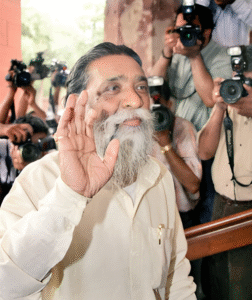
This is the story of how Shibu Soren defied the system.
By the 1970s, Shibu Soren had emerged on the socio-political map of Jharkhand. The fiery Dishom Guru Shibu Soren, who was in his thirties, was seething with the injustice done to the tribals and was turning rebellious.
But before this, one incident occurred that would go on to define the political destiny of Shibu Soren.
Shibu Soren’s father, Sobaran Soren, was a schoolteacher by profession and a staunch Gandhian by principles. His awareness and activism made him a constant thorn in the side of the local moneylenders. During that time, moneylenders held a reign of terror over Jharkhand’s tribal communities-entangling them in vicious debt traps and extorting repayments far beyond what was owed. In many cases, failure to repay interest resulted in the loss of tribal lands, seized mercilessly by these exploiters.
The tribals who took loans to farm were often denied their rightful earnings, as moneylenders would seize a large share of their produce and profits.
Sobaran Soren firmly opposed these injustices, which made him a target of hatred among the moneylenders of Ramgarh-the very place where Shibu Soren was born. At the time, Shibu was still a student. But everything changed on the morning of 27 November 1957, when he received the devastating news that his father had been murdered.
The incident proved to be a turning point in Shibu Soren’s life. He gave up his studies and began contemplating resistance against the oppression faced by his people. Determined to fight back, he started mobilizing a group of tribal youths. Thirteen years later, in 1970, Shibu Soren took full charge of the movement, emerging as its undisputed leader.
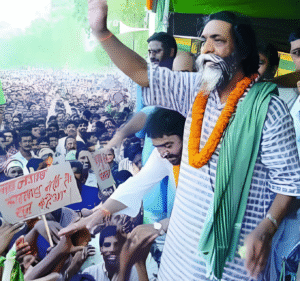
During this period, Shibu Soren was honored with the title of Dishom Guru. In time, prominent activists like Binod Bihari Mahto and A.K. Rai joined the movement against exploitation. As the struggle gained momentum, they gradually realized the need for a political party of their own.
Where did JMM get ‘freedom’ from?
Author and senior journalist Anuj Kumar Sinha has mentioned the formation of Jharkhand Mukti Morcha in his book ‘Unsung Heroes of Jharkhand’.
On 4 February 1972, Shibu Soren and Comrade A.K. Roy met at the residence of Binod Bihari Mahto. In this historic meeting, they resolved to form the Jharkhand Mukti Morcha—a political movement aimed at bringing transformative change to Jharkhand and securing the region’s political rights.
A year prior to this, Bangladesh had gained independence from Pakistan, with the Mukti Bahini playing a pivotal role in the liberation struggle. Inspired by the word ‘Mukti’ (freedom), the Jharkhand Mukti Morcha was formed—driven by the dream of a separate Jharkhand and the liberation of its people from systemic exploitation.
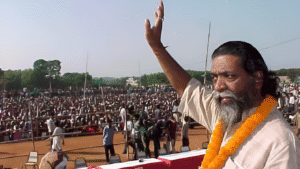
Start of Dhankatni movement
A few years later, as the youth movement gained momentum, Shibu Soren launched the Dhankatni movement. Under his leadership, tribal youths began harvesting the standing paddy crops of exploitative moneylenders—a symbolic act of reclaiming what was rightfully theirs. During these actions, other tribal youths stood guard with traditional bows and arrows. These very bows and arrows would go on to become the enduring political symbol of Shibu Soren and his movement.
The Dhankatni movement brought Shibu Soren into the spotlight. For the tribals who had endured generations of oppression, he emerged as a hero—a leader who could liberate them from the chains of usury, exploitative moneylending, and systemic injustice.
Shibu Soren launched a powerful movement against moneylenders in regions like Ramgarh, Giridih, Bokaro, and Hazaribagh. At the time, landlords and members of the moneylending community had seized vast stretches of tribal land through deceit and fraudulent practices, leaving the tribal population dispossessed and voiceless.
The call for Dhankatni echoed to the beat of the Mandar drum.
Shibu Soren, along with his companions, led agitations across regions like Tundi, Palma, Topchanchi, Dumri, Bermo, and Pirtand. Every October, tribal women armed with sickles would enter the landlords’ fields, harvest the standing crops, and reclaim what was taken from them. The call for action echoed through the villages, announced to the rhythmic beat of drums. While the women harvested, tribal youths stood watch with bows and arrows, guarding the fields and the movement with fierce determination.
The clashes led to a breakdown of law and order, and lives were tragically lost in the ensuing conflicts. Amidst this turmoil, Shibu Soren sought refuge in the dense forests of Parasnath, from where he revitalized and directed the movement.
Went to Sir Ganga Ram Hospital to pay homage to Shri Shibu Soren Ji. Also met his family. My thoughts are with Hemant Ji, Kalpana Ji and the admirers of Shri Shibu Soren Ji.@HemantSorenJMM@JMMKalpanaSoren pic.twitter.com/nUG9w56Umc
— Narendra Modi (@narendramodi) August 4, 2025
During this movement, Guruji set a clear code of conduct for his fellow agitators. He declared that the fight was for the fields—and it would be fought only in the fields. As a result, throughout the entire struggle, not a single woman from the moneylender or elite class was harmed, nor was any property targeted—except the farmland at the heart of the protest.
When Guruji had to surrender
On 25 June 1975, Prime Minister Indira Gandhi declared a state of Emergency across the country, granting sweeping powers to the government machinery. An arrest order was issued for Shibu Soren, but he had already gone underground. At the time, K.B. Saxena was serving as the Deputy Collector of Dhanbad. Recognizing Shibu Soren’s influence and potential, Saxena approached him, explained the gravity of the Emergency laws and the political implications, and ultimately persuaded him to surrender.
READ ALSO – Lord Krishna Was the First Mediator”: Supreme Court Remarks in Banke Bihari Temple Case
Guruji melted after listening to Chhath song
Shibu Soren surrendered in 1976 and was lodged in Dhanbad Jail. An incident during his time there reveals a different side of the fierce agitator—a glimpse into the emotional depth of a man known for his relentless political and social struggle. It showed that behind the firebrand leader was a deeply sensitive individual in his personal life.
Shibu Soren was in jail during the months of October–November, a time when the Chhath festival is widely celebrated across Bihar and Jharkhand. One day, he heard a female prisoner singing Chhath songs in a soft, sorrowful voice—her longing and pain echoing through the prison walls.
Senior journalist Anuj Kumar Sinha, who heard this story directly from Shibu Soren, recounts: “Shibu Soren was deeply moved when he heard a female prisoner softly singing Chhath songs inside the jail. He couldn’t quite grasp the meaning of her sorrowful tone, so he turned to Jhagdu Pandit, a fellow Jharkhand movement worker who was also imprisoned. Jhagdu explained that the woman used to observe Chhath every year, but this time, being in jail for a crime, she couldn’t perform the rituals—so she sang the devotional songs in deep pain.” By then, Shibu Soren was already widely recognized as a tribal leader. Yet the anguish of a non-tribal woman deeply affected him. Touched by her devotion and grief, he made arrangements for her to observe the Chhath fast within the jail itself.
Shibu Soren, who has already shown his leadership skills, showed his leadership qualities in jail as well. Shibu Soren appealed to all the prisoners that they will not eat one evening meal and that money will be used to buy things for Chhath Puja. This is what happened. All the prisoners skipped one meal and the woman performed Chhath Puja with traditional faith.
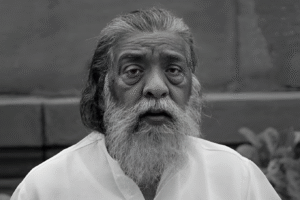
He quarreled with his uncle for not giving up drinking
In tribal society, the consumption of alcohol and handia (a traditional rice beer) is culturally accepted and quite common. However, despite being a prominent leader of the tribal community, Shibu Soren always maintained a strict personal distance from intoxication. His commitment to prohibition was so strong that, on one occasion, he became furious with his own uncle for drinking-and even went so far as to reprimand him physically.
The Panchayat began by establishing a local court to resolve disputes.
Shibu Soren was deeply committed to upholding the dignity of women and never tolerated any form of disrespect toward them. Recalling one such incident, senior journalist Faisal Anurag narrates that Shibu Soren was once returning to Dhanbad after attending a program in Dumka. He was in such a hurry that he didn’t pause for food or even a cup of tea along the way. But then, something unexpected happened—his car came to a sudden halt in the middle of the journey.
Shibu Soren reached a village. A cot was laid out for him. It was found out that there was a case of molestation of a girl. He set up a court there and left only after giving the verdict. However, due to this panchayat, he got delayed by 5-6 hours in reaching Dhanbad.
When the police surrounded Shibu Soren at night
This was during the peak of Shibu Soren’s movement. He was in the forested area of Palma, having a quiet meal late at night. Suddenly, the silence was broken by the barking of a dog. Instantly alert, Shibu sensed something was wrong.
His house stood on a hill-he jumped down and rushed ahead, only to find the entire hillside surrounded by security forces. Without wasting a moment, he beat the drum-a pre-arranged signal to alert the nearby tribal villagers.
A group of tribals quickly responded to the drum signal and rushed to the spot. They surrounded Shibu Soren, taking him under their protection. As more and more tribals gathered, their sheer numbers and determination compelled the police force to retreat.
READ ALSO – PM Modi Stands Firm as Trump Intensifies Pressure Over India’s Russian Oil Imports
Political journey
Shibu Soren, who went on to become the Chief Minister of Jharkhand three times, contested his first election in 1980-but faced defeat in that initial political battle. However, he bounced back and won the mid-term elections three years later.
In 1991, the Jharkhand Mukti Morcha (JMM) forged an alliance with the Congress for the Bihar Assembly elections, achieving remarkable success.
Today, Shibu Soren’s political legacy continues through his son, Hemant Soren. Under his leadership, JMM stands as the largest political party in Jharkhand.
